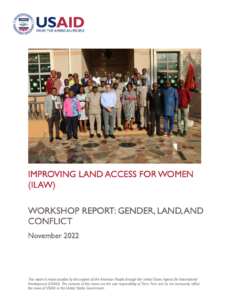 The Improving Land Access for Women (ILAW) project aims at reducing discrimination and inequality faced by women in accessing land in Cote d’Ivoire. The baseline Political Economy Analysis (PEA) found that women’s land rights are especially vulnerable during disputes as women tend to have less economic and social power than men, and actors involved in conflict mediation and arbitration can perpetuate gender stereotypes and social norms unfavorable to women.
The Improving Land Access for Women (ILAW) project aims at reducing discrimination and inequality faced by women in accessing land in Cote d’Ivoire. The baseline Political Economy Analysis (PEA) found that women’s land rights are especially vulnerable during disputes as women tend to have less economic and social power than men, and actors involved in conflict mediation and arbitration can perpetuate gender stereotypes and social norms unfavorable to women.
As part of its Social Behavior Change Plan (SBCP), ILAW identified discussion and training forums for targeted government officials as a priority action. By raising awareness and building capacity of these government officials involved in managing conflicts and gender-based violence (GBV) related to women’s land rights, ILAW hopes to reduce the vulnerability faced by women and create the conditions for change.
The first two workshops — one for the project’s northern zone (organized September 13-15, 2022) and one for the project’s western zone (organized September 20-22, 2022) — targeted government officials involved in land dispute management. These authorities included sub-prefects, regional directors of agriculture, regional directors of construction, regional directors of women, family and children, the courts and official government mediators. The workshops took place over three days covering the following topics:
• General concepts on gender and gender bias • General concepts on women’s land tenure and its importance
• The Ivoirian and international legal and institutional framework for gender
• The Ivoirian and international legal and institutional framework for land tenure and inheritance
• Principles and practices of gender-sensitive land conflict management • Participatory exercises and case studies shared by participants on women’s land rights
• Personal action plans for better taking into account gender in conflict management
The second set of workshops — one for the project’s northern zone (organized October 4-5, 2022) and another for the project’s western zone (organized October 5-6, 2022) — targeted government officials and civil society members involved in managing gender-based violence (GBV). Specifically, participants included social workers, technicians from the Ministry of Family, Women and Children, presidents of anti-GBV platforms, GBV focal points for the police and gendarmerie, and CSOs. ILAW targeted these actors as they often come across cases of GBV related to land disputes, but have limited capacity with respect to land tenure and land conflict analysis.
The training and discussion forum took place over two days covering the following topics:
• The linkages and importance of considering women’s land rights for development and reducing gender-based violence
• The legal and institutional framework for land rights, including inheritance, in Cote d’Ivoire
• Case studies of GBV cases with a link to land disputes
• Discussion on strategies to improve the management of GBV cases linked to land disputes
In addition to training and discussion, ILAW also took advantage of the gatherings to present and get input on the project’s communication and legal referencing strategies implemented by project partner AFJCI, who participated in the workshops. The workshops therefore enabled ILAW and 4 AFJCI to communicate with these key stakeholders on the legal assistance to be provided through legal clinics and encourage government officials to avail of these services.
The remainder of this document contains a compilation of the French workshop reports from these four trainings. The reports include more details on the training program as well as examples of cases shared by participants. The reports also contain examples of individual action commitments shared by participants at the end of the training. Several overall observations are made:
• Land conflict authorities generally had only rudimentary understanding of gender, with many believing that gender was something for women that did not concern men. The basic gender sensitivity training was therefore eye-opening and made more effective by the participation of high-level government trainers such as a representative from the National Observatory on Equity and Gender (ONEG). The various action plan commitments demonstrated how a short training can go a long way in changing attitudes about this key topic. The framing of gender sensitivity as part of “social inclusion” was particularly effective with this target audience as it resonates with their understanding of their mandate as authorities.
• GBV officials, in contrast, had a relatively strong understanding of gender but a poor understanding of land tenure, land rights and inheritance rights. The second set of workshops therefore helped fill that gap, which is important given that Cote d’Ivoire defines land discrimination against women as a form of GBV. This will enable these actors to better identify land tenure dynamics in cases they receive as well as appropriate ways to address these underlying dynamics per national land and institutional mandates.
• The workshops created a positive dynamic for coordinated action amongst government agencies that often do not collaborate directly together. For example, many did not know or understand the mandate of the mediators, and there was evidence of institutional competition between some actors (like the courts and sous-prefets) as part of conflict management. The workshops therefore created a space for better understanding the mandates of each actor and building a network of officials working to improve women’s land access. ILAW will follow up with these officials individually as well as part of the regional multi-stakeholder forums on women’s land rights foreseen in the first half of 2023 in the hopes that many will become staunch allies of the project and women’s land rights more generally.

